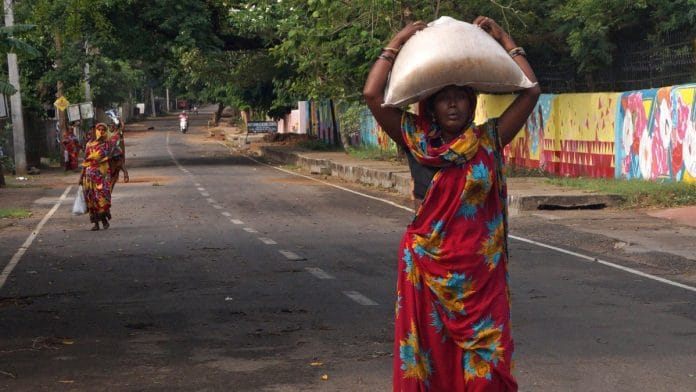
Thank you dear subscribers, we are overwhelmed with your response.
Your Turn is a unique section from ThePrint featuring points of view from its subscribers. If you are a subscriber, have a point of view, please send it to us. If not, do subscribe here: https://theprint.in/subscribe/
At first, they came for the ration, but then they stayed for the interactions, the games, the laughter. We were working with senior citizens in Cheetah camp, the last large warren of transit camps and self made basti, in Mankhurd, signalling the end of the city of Mumbai on the extreme eastern end.
Our work, as gerontologists with Pana Wellness Centre, was to provide engagement activities for the senior citizens among the urban poor in the city. With the support of Vidyavardhini Foundation that works in the disability sector in this area, we started. We have a small group of around 30 members, a mix of members from both the Muslim and Hindu community. Most of them elderly women, single, widowed or divorced or abandoned and a few men. We have three couples.
With some experience of working in the engagement space with elderly among the middle classes in the country, we thought the urban poor elderly too, would be happy with engagement, games, interaction, some gupshup, some sharing of personal grief etc.
We did not count on what we would have to brace for – unending poverty and unfinished life business. If for the middle class urban elderly, life has phases- job, childbirth, retirement, grandchildren… and only a financial insecurity for the self in their twilight years, – for the urban poor elderly here, the responsibilities are unending. Around 9 of our members, are still taking care of grown up children, some of them caring for grandchildren even, after some child has either passed away, is suffering from an illness or has failed to get a job or worse, is into drugs.
`Hamara vanvaas khatam nahi hota (our life in exile, doesn’t end)’, as one member S puts it. She lost two sons, one to suicide, another to floods and consequent illness. She has one surviving son. Another of our members lost a son to suicide when he was in the early 20s. The woman says she did not leave home for six years, she was so shocked by the suicide. It is only in the last few years that she is venturing out, as her other son, is paralytic and dependent on her. She makes do with selling eggs by the street. Another member, 70 herself, says she was married off at the age of 12 to a man who was 45. The husband is now over 100, and her one son, is suffering from cancer. Both of who she has to care for. A, another member aged 70 plus, cares for her daughter and grandchildren with her meagre pension.
For the others, there is always a son who is unemployed, just lost employment, is looking for a job, or a divorced daughter with children to care for. Finance is always strained. And yet it is not that our members did not work in their youth. Despite poor literacy, most of the women here worked – in schools, as housemaids or in the Middle East, one of them even in England! They built houses with their hard earned money, educated their children and married them off. And now, have no savings at all. Some lost jobs during Covid, in schools as ayahs, and now are too old to go back. The silver lining is that most of them are being supported in whatever meagre way by their other surviving children. Yet that is not enough. For many, work continues in the zari work housework industry here, despite failing eyesight.
It was therefore, the need for food, some ration support that kept them coming to our centre in the beginning. We topped it with blanket donations during the winter.
The WHOQOL-OLD, the questionnaire on Quality of Life, for the Elderly by the World Health Organisation, defines quality of life to include physical and emotional health, autonomy or ability to be independent, have social relations, environmental and financial safety and pursue spiritual beliefs if any. Our members are drained both physically and emotionally, they have no choice but to be on their toes to be independent, but they have good social relations- something about the poor taking care of the poor. Even if they are unfed by their own family, somebody in the neighbourhood will give them food. Ration is available and cheap civic hospitals are supportive. Spiritual pursuits are the only solace, but the anxiety about money for the self and that one family member who has failed to launch, is unabated.
Pana Wellness Centre works in the senior citizen space and is run by director, Wyonna Dsouza. Aruna Chakravorty is a psychologist and gerontologist, facilitator and resource person in Pana Wellness Centre. They can be contacted on: panawellbeing@gmail.com
These pieces are being published as they have been received – they have not been edited/fact-checked by ThePrint.


COMMENTS